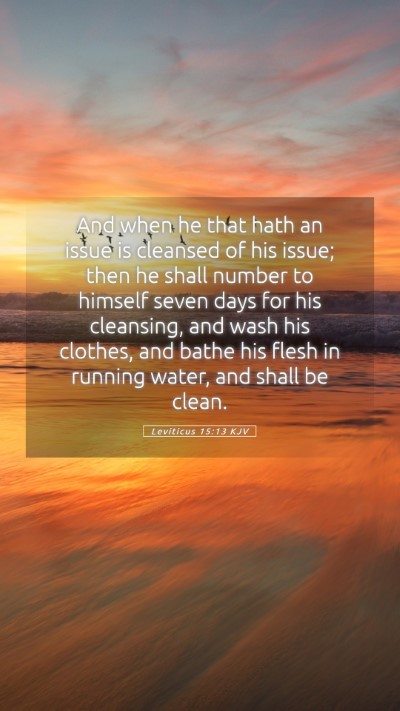Bible Verse Meaning: Leviticus 15:13
Leviticus 15:13 states, "And when he that hath an issue is cleansed of his issue; then he shall number to himself seven days for his cleansing, and wash his clothes, and bathe his flesh in running water, and shall be clean: and after that he shall come into the camp, and shall tarry abroad out of his tent seven days."
Understanding Leviticus 15:13
This verse is part of the larger section of Leviticus that deals with ceremonial cleanliness, particularly regarding bodily discharges. It outlines the steps necessary for someone who has experienced a discharge to be restored to a state of ritual purity before re-entering the camp and engaging with the community.
Commentary Insights
-
Matthew Henry's Commentary:
Henry emphasizes the significance of cleansing and the symbolism of the washing process. He notes that the seven days of cleansing signify a complete period of purification, which serves as a reminder of the necessity of spiritual renewal. He also points out that the physical act of washing reflects a deeper spiritual need for purification from sin.
-
Albert Barnes' Notes:
Barnes explains the importance of cleanliness in the camp of Israel, showing how it symbolizes divine holiness among God's people. He argues that public health and spiritual purity were interconnected, maintaining a barrier against unsanctified persons who could defile the community. His commentary relates the cleansing process to the mercy and grace offered by God through His laws.
-
Adam Clarke's Commentary:
Clarke underlines the ritual of washing as a foundational aspect of Israelite life. He provides a historical perspective on the cultural significance of bodily discharges that may seem foreign today. Clarke also observes that the conditions set forth required community accountability and respect for divine order, reinforcing the notion that purity is vital for fellowship with God.
Applications of Leviticus 15:13
This verse applies today in many contexts:
- Spiritual Cleansing: Just as the individuals needed to follow the prescribed cleansing rituals, believers are reminded of the necessity for spiritual hygiene in their lives—confession, repentance, and seeking God’s forgiveness.
- Community Integrity: The emphasis on community purity highlights the importance of maintaining integrity and accountability within modern faith communities, fostering an environment that honors God.
- Understanding Ceremonial Laws: Engaging with ceremonial laws provides insight into the life of the early Israelites and points towards the ultimate sacrifice of Christ, who cleanses believers from all unrighteousness.
Cross References
- Leviticus 14:8-9: Details regarding the cleansing of leprosy.
- Hebrews 10:22: Encourages believers to approach God with a sincere heart and full assurance of faith, corresponding to the themes of purity.
- John 3:5: Discusses spiritual rebirth through water that parallels the physical washing outlined in Leviticus.
- Ephesians 5:26: Highlights the idea of being cleansed and sanctified through the word of God.
Conclusion
Leviticus 15:13 offers profound insights into biblical principles regarding purity, community, and divine holiness. By understanding and applying the lessons from this text, individuals can gain a deeper appreciation of their own spiritual lives and the importance of living in accordance with God's design.
For further exploration, consider joining bible study groups or utilizing bible study tools to dissect not only Leviticus 15:13 but also other challenging scripture passages.


